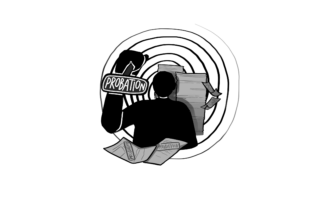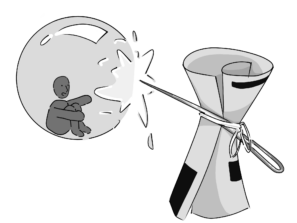Many first-world citizens currently enjoy the many entertaining facilities available on the Internet. However, a significant amount of this enjoyment involves the illegal acquisition of copyrighted material colloquially referred to as piracy. With the support of companies harmed by piracy, the US House of Representatives has recently been debating an anti-piracy bill known as the Stop Online Piracy Act (SOPA). Though we do not support piracy, the Aragon Outlook believes that SOPA should not become a law, as it would severely restrict the Internet freedoms of Americans.
Currently, the US anti-piracy policy consists primarily of the Digital Millenium Copyright Act (DMCA), which allows copyright holders or US officials to seek court orders against websites illegally hosting their content. The website would then be required to remove said material after a given time limit. The supporters of SOPA believe the current DMCA is not adequate and feel the need for stricter legislation.
SOPA also begins with a court order. However, rather than simply removing the offending content, SOPA then allows US Officials to seize and effectively shut down the entire website. If the offending website is foreign to the US, SOPA allows US officials to require service providers, search engines, payment network providers, and advertising services to prevent access or interaction with the site, effectively “blacklisting” it.
SOPA’s primary danger is its capability of causing enormous collateral damage throughout the Internet, endangering large websites that allow users to post content. Should a YouTube user upload a video of him or herself singing to a copyrighted song, for example, YouTube would then contain copyright infringing material under SOPA. The government could then legally seize YouTube and prevent the public from being able to access it. Websites like YouTube, MediaFire, and Facebook, would be forced to attempt the feat of policing their content as it is posted in real time. As this is nearly impossible, many websites would likely miss something, thus risking government seizure and shut down.
Though supporters of the bill claim that benign sites like Facebook and YouTube will not be harmed, the vague language used in the bill disagrees. Facebook and YouTube both satisfy the criteria for “US-directed websites” as they do business in the US and serve US customers. Regardless of their financial weight in the market, these sites would still be subject to SOPA and would also be forced to undergo major content upheavals and policing or risk elimination. The fact that SOPA’s supporters are exempting these websites implies that they are in fact infringing copyright law and weakens the validity of the bill.
Meanwhile in the Senate, SOPA’s cousin, the PROTECT IP Act (PIPA), is proposing similar steps against such websites. Unlike SOPA, PIPA targets a smaller range of websites and has thus drawn less controversy. However, the idea behind PIPA is the same as that of SOPA, and is a message that the US government accepts censorship as a tactic to police the Internet.
Oregon Senator Ron Wyden, who succeeded in shutting down PIPA’s overpowered predecessor, is threatening to filibuster if SOPA comes to a vote. Wyden and his supporters have created a website, http://stopcensorship.org/, for people to provide their names to be read during the filibuster.
Congress also fails to account for the constantly changing nature of the Internet, as demonstrated by the quick emergence of Google and Facebook. The same regulations and laws that govern society do not necessarily apply to a reality where the entire globe is merely separated by computer screens. A direct bill like SOPA will not be able to fight the sophisticated system of Internet piracy. In fact, a program has already been developed that would circumvent SOPA through the use of rotating proxy servers, making SOPA obsolete before even being passed.
Furthermore, statistics report that piracy is even on the decline in some countries and in some media. In the US, new services such as Spotify and Pandora enable users to readily access music without the need for illegal downloads, providing a means for users to access free, legal music more easily than pirating. Eliminating piracy’s usefulness by providing alternatives like these could well prove more effective than a bill directly targeted at piracy.
SOPA’s greatest danger, however, is the precedent it sets. After passing one bill allowing website censorship, Congress could lean towards more restrictive Internet policies. Are we headed down a path towards Internet censorship equivalent to China?
Though the Outlook agrees with the spirit of the bill, the severe punishments it proposes lack true effectiveness. The vague language threatens to cause unintended consequences for the Internet. Instead, the government should seek other means of combating piracy.
This editorial was written by Brandon Liu, Brian Barch, and Dylan Wang


